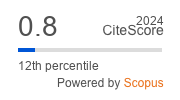STUDY OF THE PHASE AND IMPURITY COMPOSITION OF PD—BA AND PT—BA CATHODE ALLOYS
https://doi.org/10.17073/1609-3577-2015-3-212-220
Abstract
We have studied the phase and impurity composition of Pd—Ba and Pt—Ba cathode alloys obtained on an A 535.02TO arc melting plant using a technology developed by AO Shokin NPP Istok. The study showed that the concentration of detrimental impurities (C; Zn; Cu; Al) in the specimens is within the allowed range. Pd—Ba tapes are rich in Ba but this does not compromise their quality. We have confirmed the earlier found domination of two−phase composition in Pd—Ba and Pt—Ba alloys where one of the phase is an intermetallic compound (Pd5Ba, Pt5Ba) and the other is a noble metal(the matrix). The intermetallide is distributed in the platinum metal matrix quite inhomogeneously, this tangibly impairing the operation parameters of cathodes produced from these alloys. For the first time we have shown the high efficiency of transmission electron microscopy for studying Pd—Ba and Pt—Ba cathode alloys. We have for the first time found the Pd2О phase in Pd—Ba. It may significantly reduce the secondary electron emission coefficient and the quality of devices based on this alloy. We have determined the Pd and Pd5Ba grain size in the Pd—Ba alloys and the Pt and Pt5Ba grain size in the Pt—Ba alloys. All the Pd and Pt5Ba grains contain high densities of randomly arranged dislocations, and Pt5Ba grains contain internal stresses. Recommendations have been given concerning the improvement of the current Pd—Ba and Pt—Ba cathode alloy tape technology.
About the Authors
V. G. KostishynRussian Federation
Vladimir G. Kostishyn — Dr. Sci. (Phys.–Math.), Prof., Head of Department of the Technology of Electronic Materials at the MISiS
S. D. Kaloshkin
Russian Federation
Sergey D. Kaloshkin — Dr. Sci. (Phys.– Math.), Prof.
A. Yu. Adantsov
Russian Federation
Artem Yu. Adantsov
N. D. Ursulyak
Russian Federation
Nazar D. Ursulyak
A. G. Nalogin
Russian Federation
Aleksey G. Nalogin
G. V. Drovenkova
Russian Federation
M. N. Chabachev
Russian Federation
Maxim. N. Chabachev
E. К. Gorskii
Russian Federation
Eugene К. Gorskii
References
1. Djubua B. Ch., Koultashev O. K., Polivnikova O. V. Emission electronics; nanotechnology; synergetics (To the history of ideas in cathode technolog. Electronnaya Tekhnika. Series 1: SVCH−Tekhnika = Electronic Engineering. Ser. 1: Microwave Engineering; 2008; no. 4 (497); pp. 3—22.
2. 2 . Djubu a B . Ch .; Z emch i k h i n E . M .; Kou lt a shev O. K .; Makarov A. P.; Negirev A. A., Polivnikova O. V., Rozhkov S. E. Floatable metal cathodes for use in microwave devices with high current density. Electronnaya Tekhnika. Series 1: SVCH−Tekhnika = Electronic Engineering. Ser. 1: Microwave Engineering, 2013, no. 4 (519), pp. 196—199.
3. Myasnikov A. Metal Floatable cathodes for magnetrons millimeter range with the end gun. Diss. for the degree of PhD. Tehn. Sci. Saratov: Saratov State Technical University named after Yu. A. Gagarin, 2011. 114 p.
4. Djubua B. Ch., Korolev A. N. Modern effective cathodes (To the history of their creation in FSUE «RPC «Istok». Electronnaya Tekhnika. Series 1: SVCH−Tekhnika = Electronic Engineering. Ser. 1: Microwave Engineering, 2011, no. 1 (508), pp. 5—24.
5. Esaulov E. P. Methods of electric melting in the development of special alloys for the electronics. Electrometallurgy, 2011, no. 4, p. 30—33.
6. Pashkov A. N., Romanova U. V., Popov R. N., Dubinina O. V., Khabachev M. N. The development of production technology for cathode alloys based on platinum group metals for high−power electrovacuum microwave device. Electronnaya Tekhnika. Series 1: SVCH−Tekhnika = Electronic Engineering. Ser. 1: Microwave Engineering, 2014; no. 4 (523); pp. 73—77.
7. Djubua B. Ch.; Sytnik A. Ya. Effect of hydrogen outgassing and activation of cathodes based on palladium alloy with barium. Electronnaya Tekhnika. Series 1: Elektronika SVCH = Electronic Engineering. Ser. 1: Microwave Electronics; 1976; no. 6; p. 68.
8. Lee I. P., Bondarenko G. G. Hydrogen−vacuum treatment of palladium powders for efficient metal−alloyed cathodes of non− heated magnetron. Perspektivnye materialy, 2012, no. 1, pp. 30—34.
Review
For citations:
Kostishyn V.G., Kaloshkin S.D., Adantsov A.Yu., Ursulyak N.D., Nalogin A.G., Drovenkova G.V., Chabachev M.N., Gorskii E.К. STUDY OF THE PHASE AND IMPURITY COMPOSITION OF PD—BA AND PT—BA CATHODE ALLOYS. Izvestiya Vysshikh Uchebnykh Zavedenii. Materialy Elektronnoi Tekhniki = Materials of Electronics Engineering. 2015;18(3):212-220. (In Russ.) https://doi.org/10.17073/1609-3577-2015-3-212-220





































